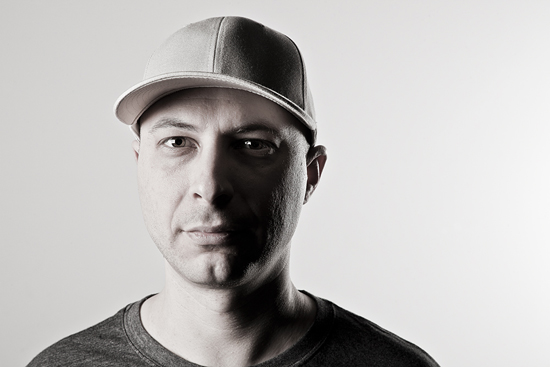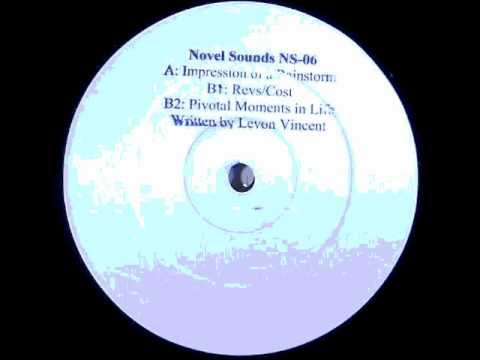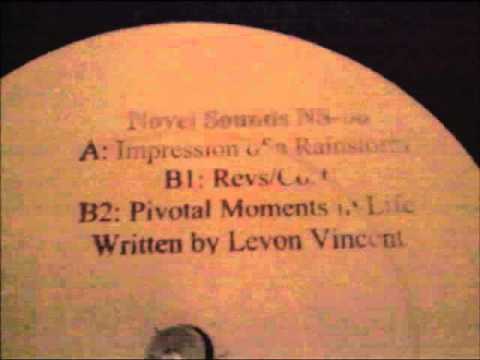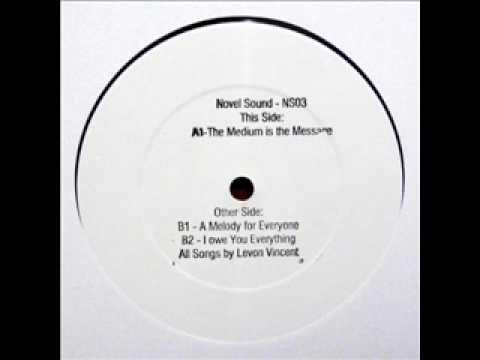Given the unremitting sternness of much of Levon Vincent’s music, you’d be forgiven for expecting him to be a slightly gruff character. Clues to the contrary are hidden in his track titles – ‘Polar Bear Make Nice With That Sealion’ was sadly shortened to ‘Polar Bear’ for inclusion on his new mix CD for fabric – but they’re unlikely to fully prepare you for the affable and humble demeanour of the man himself. During our Skype conversation, the New York-raised producer is keen to clarify and explain to the best of his abilities, apologising for talking "hot air" and at one point referring to his tracks as – fans, look away now – "cheap thrills".
Vincent’s records pull the sonic signatures of his adopted home of Berlin into the sensual orbit of New York house in a way few could hope to imitate. The results are as likely to be ugly as they are beautiful: uncanny, scorched timbres fall into odd configurations, gesturing towards dystopic techno without renouncing that seductive NY bump. Structures tend to be built around rupture, surprise and disorientation, sucking you into parallel worlds before spitting you back out on the crest of an enormous kick drum – a far cry from the reliably four-square tension-and-release patterns of many of his contemporaries. What’s perhaps more shocking is the simplicity of the music’s constituent parts. In an age of superabundance, this is music born out of ascetic self-limitation and intense focus. It’s difficult to see how such a strikingly uncompromising vision could have achieved such renown without a bit of dogged self-belief backing it up – but then it’s often the nature of the artist to be, to some degree, a confusing mix of supreme self-assurance and pathological self-doubt.
Whatever the motivations behind the music, Vincent’s fabric 63 is one of the finest mixes to grace the series in a while, blending (to steal the artist’s own turn of phrase, in a rare moment of self-aggrandisement) the "streetwise and the elegant" with consummate ease. Alongside plenty of his own tracks, it features contributions from the tight circle of NY producers who have risen to fame with Vincent in recent years – Jus-Ed, Joey Anderson, DJ QU, Black Jazz Consortium, Anthony Parasole – building a brilliantly characterful, exquisitely detailed 70 minutes of music. Stick it on loud, in a darkened room, and you’ll begin to hear why Vincent and his music inspire so much devotion from dancers and critics alike.
Speaking to the man himself fills in a few more of the blanks. Here he discusses New York mysticism, self-imposed limitations and his DJing philosophy, revealing an artist with a singular devotion to his craft.
Am I right in thinking you’re based out in Berlin these days?
Levon Vincent: Yes I am. I got a sublet for a month a couple years ago, and within like three days I called the guy and said ‘Please can I have the place?’.
So how do you find it compared to New York?
LV: It’s cool. I mean, I left the greatest city in the world. But it’s helped my career a lot. The main thing is, it’s just been so good for my emotional well being, know what I mean? That’s the bigger motivation. When I got here I felt so good and so at home immediately that my life instantly improved. I usually try to go with my instinct I guess, so that was it. I didn’t have anything with me other than what was in my suitcase, so now every time I go home I come back with a synthesiser and a pair of sneakers!
Hearing your records, I’d assumed you use a lot of outboard gear to produce. Were you able to make tracks without having a full studio setup?
LV: Well, these days I don’t need it, because for a long time I’ve been building a library of recordings of synthesisers that I’ve owned. Basically I’ve been through a massive studio’s worth of equipment one by one over the years. But I have [pauses, looks over to far wall] six synthesisers and two compressors here. I got the Space Echo too, I can’t do without that. My drum machine is sorely missed, but it’s so heavy. I thought I could make do with samples, but I want my drum machine back, that’s the one thing that’s killing me.
Do you like the interface aspect of hardware – the way it’s laid out, as compared to working on a laptop?
LV: No, I don’t care. I mean I can be purist about some things, but it’s on my whim. I don’t draw any hard lines. The interface is a bonus though. The problem with computers – not only for music, I know guys that use Photoshop and we talk about the same problems – firstly, it’s limitless so you have to define your own boundaries to have any signature whatsoever. And secondly, it takes forever to do anything, because you have to configure everything every time.
These days what I think is perfect is the hybrid setup – like Alva Noto and Ryuichi Sakamoto, they mix organic instruments with digital audio. I kind of follow the same principle I suppose. Having a million sound sources is not exciting to me right now. What I want is… pure sound, you know?
Do you consciously try to give your productions a unique sound? Your records tend to be instantly recognisable when heard over a soundsystem or in a mix.
LV: For guys that work in a field that’s limitless, that’s one of the highest compliments you can give. Thanks! I guess I know which limits to prioritise. There’s a hierarchy of limitations that are self-imposed. It’s common for people working with computers, film editors too. There’s a hierarchy that I have decided works in my world, and nobody else knows it – not because it’s great or anything, just because I haven’t told anyone. That hierarchy is what people interpret as a signature. It’s just an order of doing things. It’s like an organism I’m developing.
I understand you studied music for a while, music theory. Do you think that’s had a big effect on your career and your sound?
LV: Yeah, it’s one of the proudest things I’ve done in my life. I mean, I’m a student of music anyway, in my lifetime. I’m not dissing anybody that says, ‘That stuff is not important, find your own way,’ or whatever. But I do really respect the smith – the blacksmith, the wordsmith – you know, learn the entire body of knowledge pertaining to your field that you possibly can in one lifetime. Why wouldn’t you? I think you find your trade and then you obsess over it until you’re gone. And you’re part of a lineage in that way, there’s a lot of pride in that. You can trace, in the books that you’ve read, the texts, through the history of Western music, right back to temperament and Bach. You can be connected to the people that have come before you, you know? I’ve always thought that’s really exciting.
I didn’t study until I was in the middle of my 20s. The reason I went to study music is that [New York mayor] Giuliani killed the nightlife. Through the 90s I was a successful DJ in New York, I had plenty of gigs and played some big venues and all that. Not on the international stage or anything, but I was doing OK. But the thing that Giuliani did – there’s a law that’s from the 40s maybe, called the New York City Cabaret Law. It was originally to control bebop. Actually, there’s a lot of parallels between the [dance music] club industry and the jazz club industry in NY. What they said is, ‘OK, anyone that doesn’t have a license on the wall, issued by the local government, for dance privileges – you can serve alcohol but you’re not allowed to dance’. This law hadn’t been enforced for 50 years, so the only people who had a license were bars that had been there for years. No nightclubs, nothing that came from the disco era, nothing that would’ve come as a result of dance music. All those people had to apply for one – and 15 years later most of them still don’t have licenses. The authorities found a way to skirt things and fuck the little guy, basically – and then blame it on bureaucracy.
So your DJing stopped being viable, and you decided to go back into education?
LV: I’d reached that point in my life, personally… It’s the same reason I moved to Berlin, it’s behind a lot of things I do: because I want to grow. It seemed like the smartest move at the time. It was obvious things weren’t happening in New York any more, with the club scene. And it stayed that way for five years too.
And it was like: ‘What am I going to do, am I going to be a postman, a teacher or something – or am I really going to do this, go for it musically? Because I need to be serious, if I am’. And it really was the best thing for me. I loved every second of it, I really did. It was funny, most people [on the course] were mainly classical or jazz – out of 500 kids there was only like four or five of us making electronic music. And they hated us, we really had to put up with a lot of abuse to be there. You had to be dedicated. But at the same time, the college kids were younger. One thing I can say, from going to university at 25 or 26 years old – I would suggest to guys reading this who are sort of at a crossroads: wait! Do something else, figure some shit out. Don’t be intimidated by life’s expectations.
There was one more question I wanted to ask about your training. I’m sure I read somewhere that when you’re structuring your tracks you rely on principles like the golden mean. Is that true?
LV: Well, at first, I was all about the golden mean. When you go and learn ‘classical’ training, ‘classical’ music, what you learn is that these guys were just like we are. Or like the cosmic disco movement, that’s a great parallel – it’s these nerdy dudes, really bright, and they see something that no one else does. So your first inclination is to learn what they did and practice it. Some guys really stick with it, and those guys usually become academics. Other guys internalise it – I’d like to say that I’ve internalised most of that. Basically at this point, I’d say it’s instinctive.
I’d like to talk about the Fabric mix. Was it a a big thing to be asked to do it?
LV: Oh hell yeah, absolutely. It’s like I just won a gold medal in the Olympics or something. Because it legitimises what I’ve been doing my whole life, not only with my colleagues, but with my parents, other people. I have a different thing going on musically, I have a whole different aesthetic. One that’s not with the corporation on any level. That doesn’t mean that I stand against the corporation, but I’m not represented by one. And in our society, there’s a legitimacy that comes from being made into a product at some point – it gives you some credibility. It’s totally such an enormous step in my life.
So I took a lot of care making the disc, with the concept. I really thought about it. Because the thing is my records are disposable – when they’re gone, they’re gone. But this is permanent, you have to consider the long term. So my concept was to focus on making something that would have shelf life, but maybe at the sacrifice of an immediate ‘rave’ sort of thing.
There are two people you’re communicating with in any DJ performance: the partygoers, the listeners, and also the musicians, your colleagues. If you appeal only to partygoers you’re a sellout, and if you do only your colleagues you’re some kind of ‘underground genius’, blah, blah. They’re both entirely bullshit if you ask me. I had just come off of doing the Boiler Room, which is live on camera. So I thought, ‘I actually don’t have to prove much as far as live performance goes. If I remove that, what would my mixing style be?’
The thing I’ve been obsessed with lately is the idea that there’s essentially three major dialogues in mixing style, in specifically four-on-the-floor dance music. You have the 80s, the 90s and the 2000s. What I wanted to do – this was purist – was an 80s style mix, for the old guys. Because, when you get your first legitimate mix, that’s who you pay your homage to first – you take care of the people who taught you how to do it. What I’m known for is a 90s mixing style – long blends, combined with relatively moderate-paced track changes. The kids nowadays…
The blends are much faster.
LV: Yeah. I’m getting into that style too now, just to learn. But to me it’s over-stimulus, and after an hour you can’t dance any more because you’re exhausted. That may be because I’m getting older though.
But the way I did this mix is just how I interpret my masters to [have done it]. It’s a linear mix, with volume fades, not crossfader tricks ‘cos they didn’t have a crossfader. And you’re mixing on a couple of things: what key is the next song? And, above all else, fluent blends. In the style that I’m known for as a live DJ people forget a lot of the mistakes that happen, because you do that for a bigger reward, the performance aspect. I don’t think that translates well to what is effectively a studio recording. This disc is playing in clothing shops, it’s playing in people’s cars – this is not the time to show people how underground you are, that’s not what this is about. So that was the idea. It’s a DJ mix, it’s not a business card or whatever people say. And it’s not to try and hustle some live gigs. It’s something that’s hopefully streetwise and elegant at the same time.
How did you approach selecting the tracks?
LV: Well I knew I wanted to include some of mine, but I didn’t want to make it all mine like it’s been done before. I’m not sure that my music is good enough for 74 minutes of it. I’m pretty sure that I couldn’t listen to 74 minutes of my tunes. Especially the cheap thrills ones, the ones where you raise your hands and stuff… That would bore people. So I decided to do half mine and half other people’s. And my signature sound is part of a dialogue that’s happening in New York. There’s an identity to New York right now. There’s a level of mysticism that goes along with what we’re doing that isn’t existing anywhere else. It’s the one piece of New York identity that’s in there, this mysticism. I read on Resident Advisor I think, when they announced [the mix], that I had gone to my friends [for tracks]. But at no point did I say, ‘Oh, let me hook up my crew here,’ or anything. Where else would I go to get that mysticism? There’s no other source.
Final question – what are your plans after the mix? Are the unreleased tracks of yours going to see release?
LV: The artist that I’m really behind at the moment is Joey Anderson. The rest of us got our recognition. For me it’s baffling, in the past two years, that he’s been making these completely brilliant records that haven’t quite popped, haven’t got what they deserve. So right around the time of the Fabric release I am going to release one record on Deconstruct, and it’s the Joey Anderson tracks. I also made sure to play his tracks almost in their entirety: I opened that mix with almost six minutes of his song [‘Earth Calls’]. I cannot give a better introduction to the world. I’m doing such a favour to the listener, getting them to hear this guy.
Photo by Jimmy Mould






